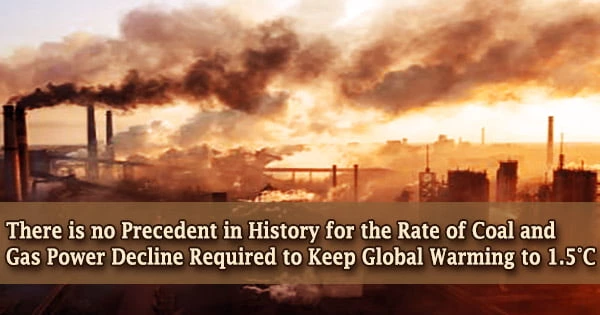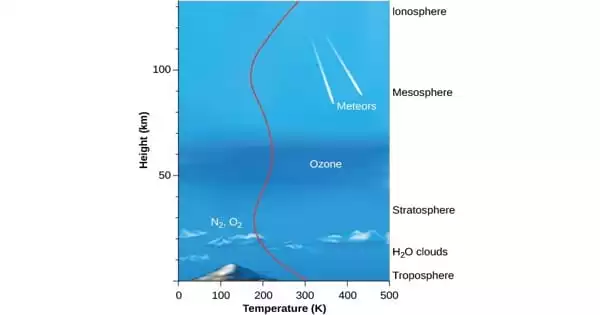According to an examination of decadal experiences of fossil fuel decline in 105 nations between 1960 and 2018, limiting climate change to the 1.5°C targets set by the Paris Climate Agreement would likely need coal and gas power consumption to fall at rates unparalleled for any significant country.
Furthermore, the findings, which were published in the journal One Earth on October 22nd, imply that the most rapid periods of fossil fuel decline in history occurred when oil was replaced by coal, gas, or nuclear power in response to energy security challenges in the 1970s and 1980s.
Decarbonizing the energy sector is a critical method for achieving the target of net-zero greenhouse gas emissions by 2050, which is required to keep global average temperatures from rising over 1.5 degrees Celsius this century.
Few studies, however, have looked at the historical precedent for such a rapid and broad shift, particularly the fall of carbon-intensive technologies that must accompany the mass adoption of greener technology.
Prior studies sometimes looked at the world as a whole but failed to find such cases, because on the global level the use of fossil fuels has always grown over time.
Jessica Jewell
“This is the first study that systematically analyzed historical cases of decline in fossil fuel use in individual countries over the last 60 years and around the world,” says Jessica Jewell (@jessicadjewell), an associate professor in energy transitions at Chalmers University in Sweden, a professor at the University of Bergen in Norway, and the corresponding author of the study. “Prior studies sometimes looked at the world as a whole but failed to find such cases, because on the global level the use of fossil fuels has always grown over time.”
“We also studied recent political pledges to completely phase out coal power, which some 30 countries made as part of the Powering Past Coal Alliance. We found that these pledges do not aim for faster coal decline than what has occurred historically,” adds Jewell. “In other words, they plan for largely business as usual.”
Jewell and her colleagues, Vadim Vinichenko, a post-doctoral researcher at Chalmers, and Aleh Cherp, a professor at Central European University in Austria and Lund University in Sweden, identified 147 episodes in a sample of 105 countries between 1960 and 2018 in which coal, oil, or natural gas use declined faster than 5% over a decade to see if any periods of historical fossil fuel decline are similar to scenarios needed to meet the Paris target.
Historically, rapid reductions in fossil fuel consumption have been restricted to tiny countries like Denmark, but such situations are less significant in climate scenarios, where reductions should occur across continents.
Jewell and colleagues focused their research on cases in which fast rates of fossil fuel decline occurred in larger countries, indicating significant technological shifts or policy efforts while controlling for the size of the energy sector, growth in electricity demand, and the type of energy used to replace the declining fossil fuel.
They used a method called “feasibility space,” which finds combinations of factors that make a climate action viable in certain situations, to compare these episodes of historical fossil fuel decline to climate mitigation scenarios.
“We were surprised to find that the use of some fossil fuels, particularly oil, actually declined quite rapidly in the 1970s and the 1980s in Western Europe and other industrialized countries like Japan,” says Jewell. “This is not the time period that is typically associated with energy transitions, but we came to believe that some important lessons can be drawn from there.”
In the past, rapid depletion of fossil fuels necessitated improvements in competing technologies, a significant desire to modify energy systems (for example, to avoid energy security risks), and effective political institutions to carry out the necessary adjustments.
“We were less surprised, but still somewhat impressed, by how fast the use of coal must decline in the future to reach climate targets,” she adds, noting that, of all the fossil fuels, coal would need to decline the most rapidly to meet climate targets, particularly in Asia and the OECD regions where coal use is concentrated.
About half of the IPCC 1.5°C-compatible scenarios predict a quicker fall in coal in Asia than any of these scenarios. The other possibilities, as well as many more scenarios for coal and gas decline in other areas, have only parallelled in smaller electrical markets where oil was replaced by coal, gas, or nuclear power in response to energy security challenges.
Finding mechanisms of fossil fuel decline that go far beyond historical experience or present promises is required to meet the 1.5°C objective. Nearly all scenarios for the fall of coal in Asia in line with the Paris Agreement’s aims, according to the authors, would be historically unique or have just a few examples.
Over half of the scenarios for coal decrease in OECD nations, as well as over half of the scenarios for reducing gas usage in reforming economies, the Middle East, or Africa, would be unprecedented or unusual.
“This signals both an enormous challenge of seeing through such rapid decline of fossil fuels and the need to learn from historical lessons when rapid declines were achieved on the national scale,” says Jewell.
















